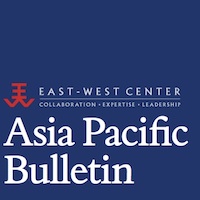SUMMARY
This is AI generated summarization, which may have errors. For context, always refer to the full article.
 Editor’s Note: The Asia Pacific Bulletin (APB) is produced by the East-West Center in Washington DC, designed to capture the essence of dialogue and debate on issues of concern in US-Asia relations. Rappler will republish APB content starting this week.
Editor’s Note: The Asia Pacific Bulletin (APB) is produced by the East-West Center in Washington DC, designed to capture the essence of dialogue and debate on issues of concern in US-Asia relations. Rappler will republish APB content starting this week.
Up against an increasingly volatile situation in the South China Sea, the Philippines is currently seeking to develop its defense capabilities against potential external threats. At a time when the United States is rebalancing towards Asia, the Philippines has an opportunity to further engage with its ally in increasing bilateral military-to-military cooperation. In addition, the Philippines’ evolving strategic partnership with Japan is also proving to be an asset with Japan providing the Philippine Coast Guard with patrol boats through its official development assistance program.
One option for the Philippines to augment its defense capabilities is to provide access for US forces to its military bases with the possibility that other countries, especially Japan, could enjoy the same privilege. This, in turn, has reignited the domestic military bases debate–a sensitive issue in the country.
The US military presence in Southeast Asia is now focused on the need for access to, rather than permanent bases in, the territory of its allies and partners. This strategy is based on the premise that US military forces will be continuously deploying on a rotational basis throughout the region.
Thus, rather than having permanent military bases as is the case in Northeast Asia, the United States will be partaking in short-term joint exercises, docking arrangements and force rotations. These activities only require access to existing infrastructures such as training facilities and not the permanent basing of US military forces.
The Philippines already has military infrastructures that in the past have hosted US forces—Clark Air Force Base and Subic Bay Naval Base. Granting the United States access to these facilities is not only logical, it is also logistically easy. All that is required is the approval of the government. Statements by Filipino President Benigno S. Aquino III and senior government officials have indicated that an increased US presence in the Philippines is most welcome.
Inviting Japan to have access to the same facilities would also be another opportunity for the Philippines to exercise increased influence on the changing regional security dynamic, especially in the South China Sea. Both countries are concerned by the irredentist actions of China and thus have common cause to seek closer security cooperation with each other.
In 2011, President Aquino and Japanese Prime Minister Yoshihiko Noda formalized the Philippines-Japan Strategic Partnership. President Aquino and Prime Minister Shinzo Abe committed to further deepen their bilateral relationship when the latter visited the Philippines in July and the two leaders agreed to closer coordination and cooperation on security and maritime issues.
Granting Japan access, however, is complicated by the fact that there is currently no formal Philippines-Japan agreement on defense cooperation that is a precondition for access. If the Philippines is intent on giving Japan access, a visiting forces agreement needs to be negotiated. Such an agreement will have to include legal constraints pertaining to personnel in each other’s territories, legal jurisdiction for criminal offenses, movement of vessels and aircraft, and other elements.
Moreover, even on the subject of providing access to the United States, there is now an internal debate in the Philippines. Senator Juan Ponce Enrile, a veteran lawmaker and former defense minister, has expressed doubts about the constitutionality of US access to Filipino military bases. He cites constitutional prohibitions barring foreign military bases, troops, or facilities unless there is a treaty ratified by the Senate that expressly permits foreign military forces to be hosted on Filipino territory.
On the other hand, Senator Loren Legarda, Chair of the Foreign Relations Committee, is of the opinion that the Philippines-United States Visiting Forces Agreement already provides for joint exercises, joint initiatives and some access to Filipino facilities, negating the need for new approval by the Senate.
Open debate on fundamental policy questions is an essential component of any vibrant democracy. In the case of the Philippines hosting foreign militaries, it puts front and center the strategic problems that the country will have to contend with as China pursues its own unilateral policy in the South China Sea.
These challenges are twofold. First, the changing regional security environment regarding China’s developing military expansion requires a comprehensive and coherent national security and foreign policy that will guide the Philippines’ response in the coming years. Second, the Philippines has to develop and sustain a modern Filipino military capable of external defense.
Decades of neglect by Filipino policymakers, along with a focus on domestic terrorism and corruption in the military, have made the Philippines’ armed forces one of the weakest in the region. Rejuvenating the mutual defense treaty with the United States, while at the same time deepening security cooperation with Japan, are pragmatic approaches that Aquino’s government have taken, but these are just stop-gap solutions. The Philippines still needs to develop and sustain its own capacity to provide for its own defense.
One strategic consideration for Filipino policymakers is that the Philippines is fast becoming the center of the pushback against Beijing’s attempt at regional supremacy. China’s perceived assertive and domineering stance and continued stalling in negotiations for a Code of Conduct in the South China Sea is pushing regional states, primarily those with shared interests, to cooperate more closely than ever.
Unlike in the past, small countries like the Philippines may not be as easily bullied by larger states. Having China as an immediate neighbor should make political leaders in these countries realize that they have to carefully think about their strategic and policy choices in the coming years. This lesson should apply more so to the Philippines–and Vietnam–as both have remained resolute in deciding not to be docile in the face of Chinese bellicosity.
The challenge for Aquino’s government is to work closely with the Filipino Congress, especially the Senate, in crafting foreign and security policies that address the Philippines’ external security concerns. Doing so will not be easy, but this is essential to ensure that Filipino interests regarding disputes in the South China Sea are not sacrificed on the altar of partisan or elite politics, as was the case in the past.
The Philippines’ long overdue attempt at improving its minimum credible defense capability needs to be a holistic exercise that integrates defense with a coherent foreign policy and strategic outlook that is long-term in perspective. Thus, the question of access to military facilities should be carefully discussed and thoroughly examined, so that it fully serves the country’s national interests and the region’s future peace and prosperity.
 Julio S. Amador III is an Asia Studies Visiting Fellow at the East-West Center in Washington and a Foreign Affairs Research Specialist in the Center for International Relations and Strategic Studies (CIRSS) at the Foreign Service Institute of the Philippines. The views expressed here are solely those of the author and not of any organization with which he is affiliated. He can be contacted via email at july32000@gmail.com. This piece was first published August 8, 2013.
Julio S. Amador III is an Asia Studies Visiting Fellow at the East-West Center in Washington and a Foreign Affairs Research Specialist in the Center for International Relations and Strategic Studies (CIRSS) at the Foreign Service Institute of the Philippines. The views expressed here are solely those of the author and not of any organization with which he is affiliated. He can be contacted via email at july32000@gmail.com. This piece was first published August 8, 2013.
The East-West Center promotes better relations and understanding among the people and nations of the United States, Asia, and the Pacific through cooperative study, research, and dialogue. For comments/responses on APB issues or article submissions, please contact washington@eastwestcenter.org.
Add a comment
How does this make you feel?
There are no comments yet. Add your comment to start the conversation.